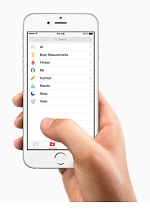 |
| Apple's iPhone with ResearchKit app--Courtesy of Apple |
Apple ($AAPL) is giving researchers the power to turn its 700 million iPhone users into participants in massive virtual trials. And the approach is already proving effective, with an iPhone-powered study of Parkinson's disease smashing the previous enrollment record by recruiting 7,406 participants in six hours.
The rapid enrollment hints at the power of the open-source ResearchKit framework introduced by Apple. ResearchKit taps into an idea that has been circulating in the clinical trial community for years: The rise of smartphones means billions of people are carrying advanced data collection devices. Apple now wants to make it easier for researchers to access the immense potential of this network and tear down the traditional barriers to participation in clinical trials in the process.
Apps developed with ResearchKit can collect data from the iPhone's accelerometer, microphone, gyroscope and GPS sensors, as well as the Health repository that stores information from third-party devices such as blood pressure and glucose level readers. Informed consent is handled on the phone, with researchers able to create interactive education forms and collect signatures. None of the data goes to Apple and all of it is de-identified once it is transmitted to servers.
Trial participants can decide whether the data are shared only with the researchers running a specific study or the broader community. And participants can leave a trial at any time, although they can't withdraw data they have already contributed because it is de-identified. Such flexibility for clinical trial participants could present some headaches for sponsors--although the huge scales could offset these issues--and there is an inherent bias in limiting the pool of participants to iPhone users.
The latter of these concerns will start to fade away when Apple releases the open-source framework next month, at which point researchers will be able to develop apps for Google's ($GOOG) Android operating system. Researchers are excited. "Having real-time data where you can look back and see gait and phonation, it's orders of magnitude more helpful in trying to find things that in real life make it better or worse," Sage Bionetworks President Stephen Friend told Nature.
- read the release
- check out Reuters' take
- here's Nature's Q&A
- and Parkinson's enrollment data